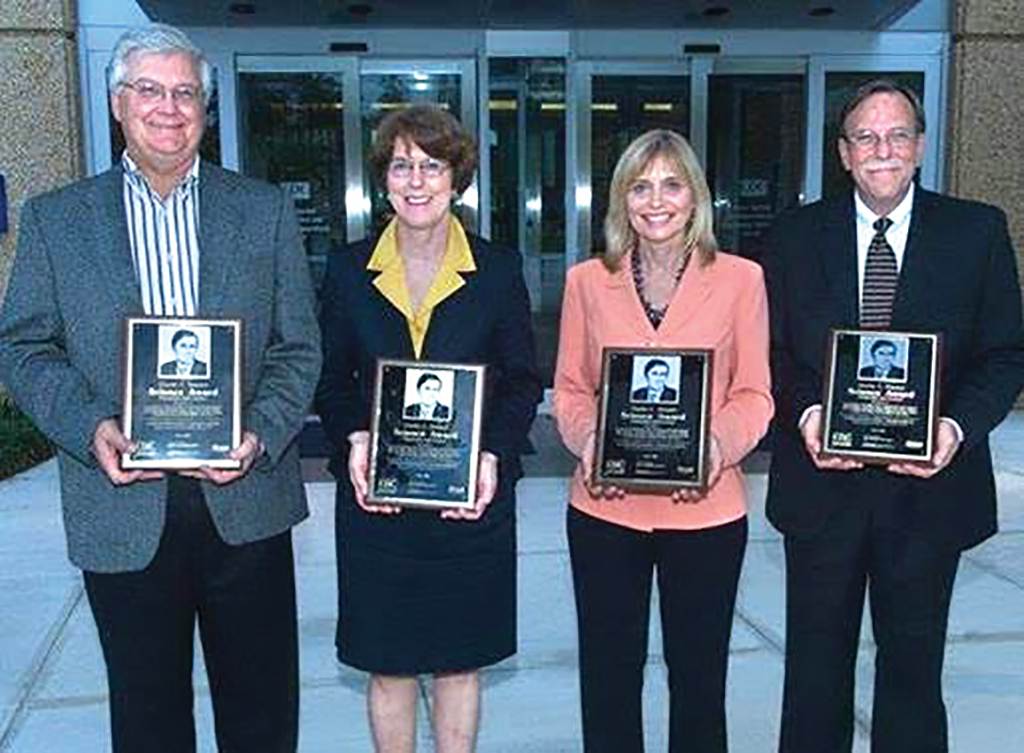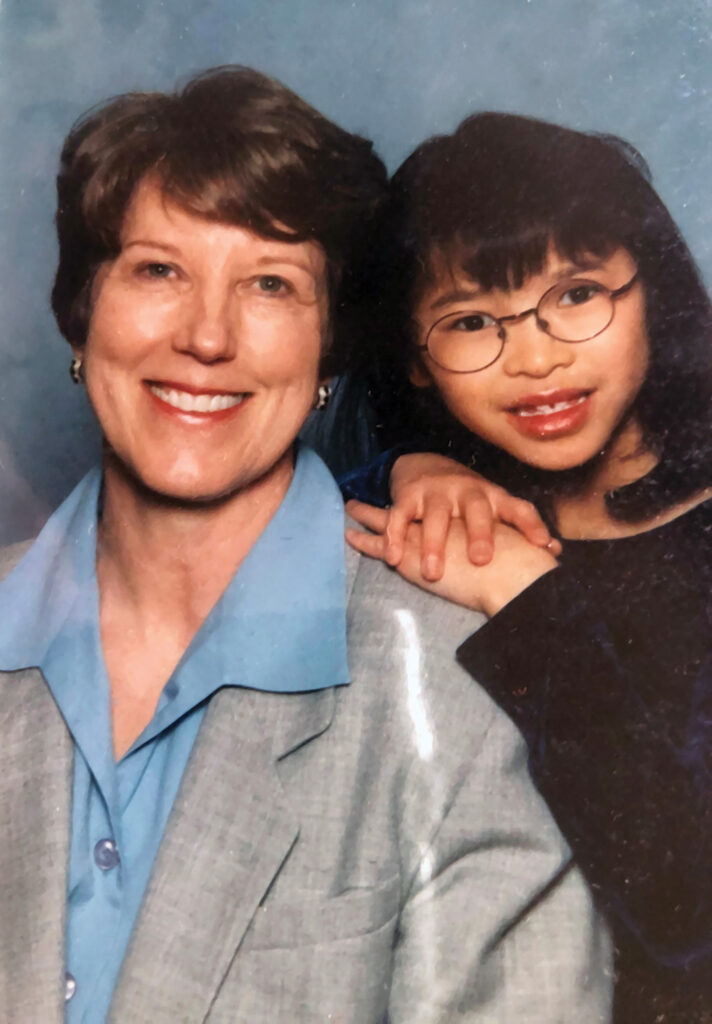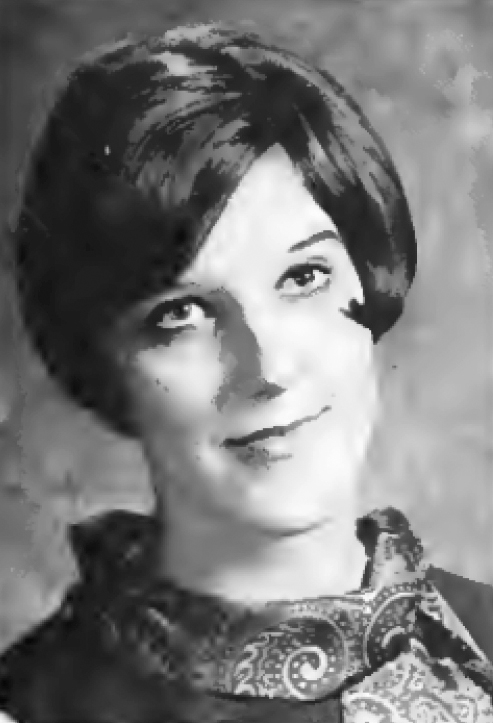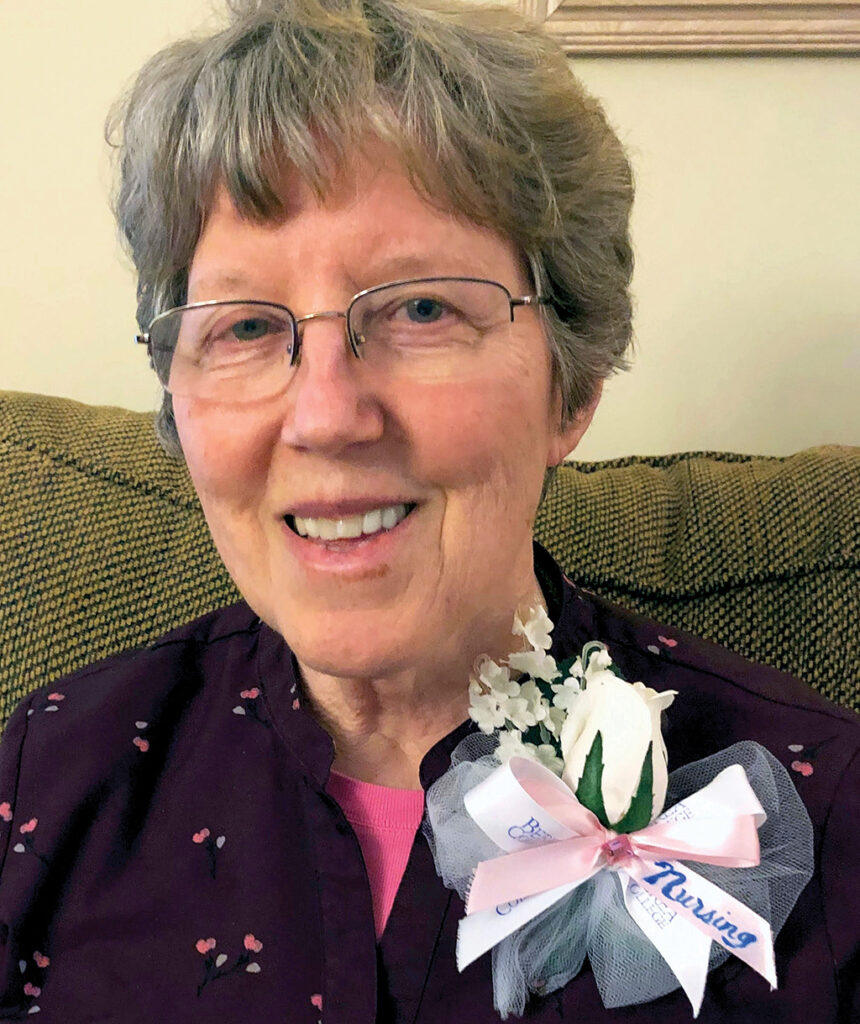Eventually, we all will rely on the words of our friends and family to tell the stories of our lives. This is the story of the life and career of R. Louise Floyd ’69 from the voices of a daughter, a best friend, a brother, colleagues and friends.
Rosa Louise Floyd was born in November 1948, the youngest of four children, in Sevier County, Tenn. Her brother, Robert, reflected on their humble beginnings. “We lived in a little shack by the road, and I mean a shack,” he said with a laugh before continuing. “To keep the cold wind out, it had newspaper lining the cracks of the walls on the inside.”
To get to school they had to walk down a mountain and wait by the river to catch the bus. Even after moving to a farmhouse in Powder Mill, Tenn., getting to school still was a challenge for the Floyd children, who regularly walked the two miles to and from their one-room schoolhouse with only one teacher for first through eighth grades.
Robert remembers his sister loved school, always very studious but also maintaining her playful side. “One time, I nailed an old can to a tree, and we would play a basketball game with a rubber ball. Louise got to be really good at it. She went on to play basketball in high school.”
After high school, Floyd made her way to Berea College. Her friend, Cal Johnson, talked about her affection for Berea. “I credit Berea with forming her love of nursing,” Johnson said. “She majored in nursing there. It was a really special program and was very important to her due to her financial situation.”
Floyd graduated from Berea College with a bachelor of science degree in nursing and continued her education at Emory University in Atlanta, Ga., earning her master’s degree in nursing. She went on to complete the Pediatric Nurse Practitioner program at the University of Alabama in 1977 and eventually earned her doctorate in nursing at the University of Alabama at Birmingham in 1988.
Throughout her extensive schooling and early experience, Floyd developed a deep love for nursing, research and the desire to help people. She was working in Tahlequah, Okla., with the Cherokee people when she became interested in researching fetal alcohol syndrome.
“She would go to Native American reservations where she became taken with the Native American culture and customs,” said Ken Dutter, one of Floyd’s best friends for more than 30 years. “It was not just a research project for her. She really came to appreciate their culture and spirituality.”
Louise was investigating alcohol use in pregnancy and using that data….It took three to five years to complete the study, and that work serves as the basis for having healthy moms and babies
Coleen Boyle
The bulk of her career was working for the Centers for Disease Control and Prevention (CDC) beginning in 1988, becoming team leader and supervisory behavioral scientist for the Fetal Alcohol Syndrome Prevention Team in 1992. Coleen Boyle, Ph.D., serves as director of the National Center on Birth Defects and Disabilities at the CDC and was Floyd’s supervisor for more than 10 years.
“Louise was investigating alcohol use in pregnancy and using that data in a very specific way,” Boyle said. “She headed a prestigious clinical trial called Project CHOICES (Changing High-Risk Alcohol Use and Increasing Contraception Effectiveness Study). She wrote the grant, performed the research, and worked with a spectrum of healthcare providers and a diverse group of women in multiple settings. It took three to five years to complete the study, and that work serves as the basis for having healthy moms and babies.”
More than two-thirds of women in the CHOICES intervention program reported reducing their risk of an alcohol-exposed pregnancy compared to 54 percent of women in traditional care.
Seven pages of publications and more than 20 awards highlight Floyd’s resume. She was inducted into the National Organization on Fetal Alcohol Syndrome Hall of Fame for contributions to the field of Fetal Alcohol Spectrum Disorders in February 2011. She also received the prestigious CDC Charles C. Shepard Award for excellence in science in the category of Prevention and Control in 2008.

Despite her storied career, Floyd felt something was missing in her life. She had always wanted to be mother. She began researching adoption and turned to Dutter for help.
“Louise talked at length about wanting a child and approached it like a research project,” Dutter said. “She looked into adoption in different countries and thought China would be the best place for her to go. She asked me to act as a god parent and help out with education. By the time she got a call from the agency, Louise had asked me if I would go with her to China.”
Dutter and Floyd made the long journey to China to adopt a 3-year-old girl named Jenshe. As a newborn, Jenshe had been left in a basket with a note on the steps of an orphanage. Floyd started the groundwork for building an extended support group of friends and family to help with Jenshe’s transition.
Robin Ikeda, M.D., M.P.H., is the associate director for policy and strategy at the CDC and became friends with Floyd. “I first met Louise when we discovered we had daughters the same age, both adopted from China, and we were using the same daycare,” Ikeda said. “There were a few of us working at the CDC who also had adopted children from China, and we would get together as a group and celebrate Chinese New Year and really just support each other.
I know family was really important to her. She was very much loved at the CDC…She is truly a great practitioner who helped improve lives.
Coleen Boyle
“As I knew her a bit better, I discovered what a top-notch scientist she was,” Ikeda continued. “Her work with mothers and children has made a difference in the world.”
Floyd continued to build relationships, casting a wide net. She was active in her church and enjoyed golfing, cooking and entertaining.
Around the time of Jenshe’s graduation from high school, having close friends and family come together to celebrate the occasion, they started to notice a change in Floyd. Her high school friend, Johnson, explained that something was wrong.
“She wouldn’t remember details from recent conversations, and something just seemed really off,” he recalled.
Her brother, Robert, also noticed a change in her speech pattern. Fortunate to have access to the best doctors, Floyd began the long, hard diagnostic process that led to the discovery of early-onset Alzheimer’s disease. She once again approached the problem as a researcher.
“Louise met this almost like a clinician,” Dutter said. “She asked a lot of questions and with little emotion.”
After some time, Floyd had to rally her troop of friends and family and prepare to deal with this unforgiving disease as she began revealing her diagnosis. She started telling church members and was brave in the face of this illness. Before knowing how it would be so vital for her, Floyd had throughout the years built a network of close relationships with friends and family. They rallied to help her with the logistics of legal and financial planning and support for Jenshe.
“She was a really good writer,” Jenshe reflected. “She always helped me with my homework because she was such a good writer. My mom is very conservative and private. We have a good relationship. She was a very genuine person, family oriented, active in her church, and she cared a lot for others. It’s so sad to see someone who is very bright, who could talk to anyone, now can’t communicate what she feels. She loved her job, and now she can’t do that.”
Ikeda, and her daughter, Lisa, continue to support Floyd’s family. Jenshe and Lisa even found themselves college roommates for a time.
“We feel very fortunate to remain connected with Louise and Jenshe,” Ikeda said. “Louise is a warm, generous and gracious human being and a brilliant scientist whose work really impacted women and children. She is someone so rare, who has a quiet grace even though she is so well known for her scientific expertise. I so admire her gentle nature. One of the things with her illness is that gentle nature remains. I’ve never seen any anger or painting herself in a bitter light with her illness.”
Dutter and Johnson continue to assist Floyd with her care and handling of some of her financial and legal matters. “Louise is and always will be my best friend,” Dutter said. “She always possessed a quiet assurance and a quiet identity in her accomplishments. Louise was a devoted humanitarian. She really used what Berea gave her.”
Floyd currently resides in a memory care unit of an assisted living facility where she receives visits from family and friends. Colleagues from the CDC visit her for lunch on a regular basis.
“I know family was really important to her,” Boyle said. “She was very much loved at the CDC…She is truly a great practitioner who helped improve lives.”

On a recent visit, Jenshe took note of something familiar. “Even though she really doesn’t talk, I can still see her personality,” Jenshe said. “I put my feet up on the couch, and she just gave me this look. She is still in there. Even though she can’t communicate, she knows me. She’s still in there.” There are some things in life you just can’t prepare for. Floyd didn’t know she would need a team of supporters someday to be her voice, to help support her daughter, to help her manage her life. She didn’t know someday her brilliant mind would betray her, or that her voice would go silent, but she built an incredible community of friends and family. Her mind may have betrayed her, but her heart and soul triumphs.




A powerful story of perseverance and I believe that Berea College gave her the needed support at the right time. Prayers that Louise Floyd is surrounded by love and support during the coming days.
[…] personal tribute that Louise’s alma mater, Berea College, published in their magazine in 2020 as “Unforgettable: The Louise Floyd Story.” Her obituary is published in The Atlanta […]